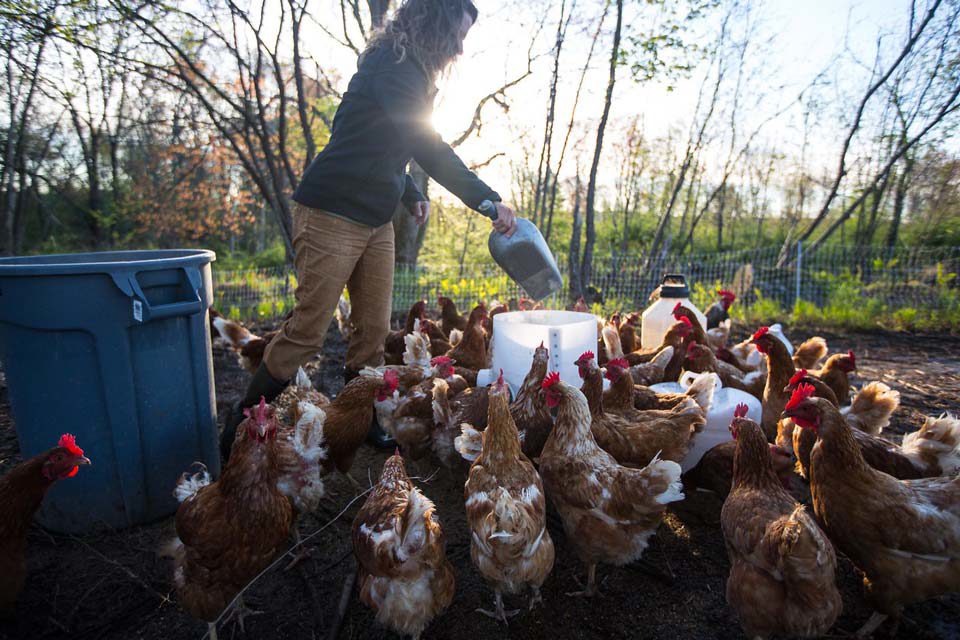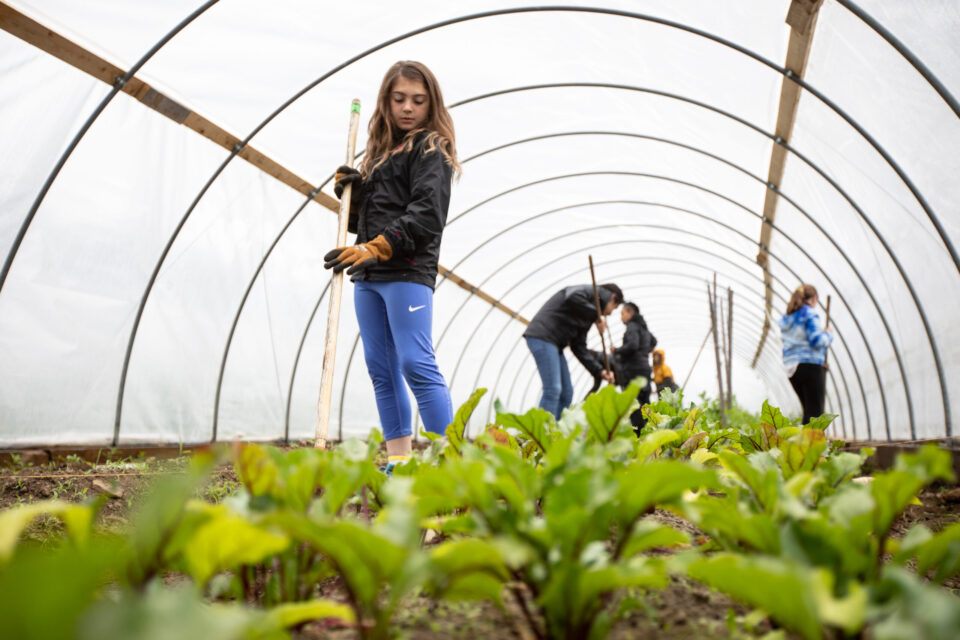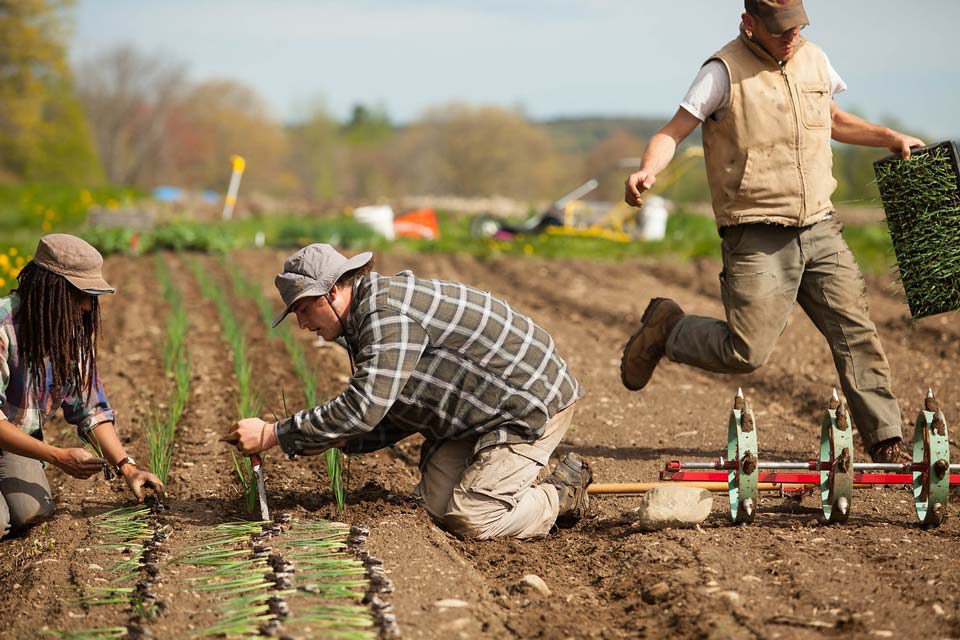After 16 incredible years building and running the Learn to Farm Program, we’re beginning a new journey!Our new programming at The Farm School leverages our resources to strengthen and deepen our mission’s work of connecting people to the land, centered on a commitment to advancing racial and human equity.
We will:
1) Work to build a relationship with the Nipmuc People, whose members are descendants of some of the original people of the land on which the farm rests. This work hopes to lift up methods they identify that will enable their community to authentically reconnect with the land at Maggie’s Farm.
2) Center the production of food more deeply at the heart of the Program for Visiting Schools, and share the fruits of our cultivation with food-insecure members of our local and partner-school communities.
3) Create new year-long apprenticeships for up to two vegetable growers, drawing forward key elements of the agricultural training from the Learn to Farm Program for them and their fellow farmer/teachers.
4) Create a farm-wide agricultural plan to meet our educational and production needs, while implementing the highest ecological standards in order to meet the pressing challenge of the climate emergency.
5) Support the advancement of on-farm programming for teachers.
-
The Farm School’s year-long Learn to Farm Program for adults trained 150 wonderful new farmers over a 16 year period in the myriad of skills we identified to operate a small farm and impact a large community. The depth and breadth of the curriculum and experience, archived here , set a new standard for farmer training. At the end of the 2018-2019 year the program took a pause to carefully consider its direction going forward.
Staff, Administration and our Board gathered in March 2019 to establish goals for refreshed and renewed programming. In our October 2019 Newsletter, sent out at the very start of the process, these initial ideas were shared with our extended community:
TO CARRY FORWARD INTO A RENEWED PROGRAM
- Enrich the Program for Visiting Schools and the Chicken Coop School
- Offer participants the experience of farming
- Hold a space for people of all races, identities and backgrounds
- Provide a source of future staff for the Program for Visiting Schools
- Embody Program for Visiting School values
- Promote confidence and leadership
- Have a staff that both teaches and farms
- Provide a program worthy of faith
- Innovate
TO BRING TO A RENEWED PROGRAM
- Prioritize racial equity and liberation work as a community, in the program and in our work on the land
- Consider serving a whole community together—bring communities into the farm experience that can integrate that experience back into their communities (just as happens with school groups at the Program for Visiting Schools)
- Consider partnering with other organizations and/or individuals
- Provide an opportunity for staff to follow their own farming interests in order to innovate for the community and the world
- Create more flexible program formats and multiple ways of accessing programming
- Consider making the farm a hub of land connection and food for our local, underserved community
- Create resilience, both economically and through agroecological land use
- Build in time for staff and program renewal
- Re-center the program on and around the Program for Visiting Schools, which is The Farm School’s shining gift to the world
Over the following year, while continuing to milk cows, grow veggies and provide programming for children (until interrupted by the pandemic!), The Farm School staff created, modeled and then circulated to the larger Farm School community a survey to gather our community’s beliefs, hopes, memories and concerns about the program that was, and what could be. This input informed a successful RFP (Request for Proposals) for new program ideas. Several months of work shaped the synthesis and essence of these submissions into our new suite of programs, which were unanimously approved for adoption by The Farm School Board of Directors in February, 2021.
-
The Farm School intends to follow its mission to its deepest root by directly and actively building relationships with the Nipmuc in order to uplift methods that they identify will enable their community to authentically reconnect with the land we know as Maggie’s Farm.
In many ways the school’s mission “to connect people to the land” is most intimately tied to a recognition that the land the organization holds by title is land with which the Nipmuc were in direct relationship with for thousands of years; and that the ability for the Nipmuc to live in physical connection with this very land has been disrupted. Connection was and is severed. Seeking to build a deeper relationship with the Nipmuc that uplifts their proposals and honors a self-determined process of reconnection and relationship with this land is integral in the most foundational way to the very core of our mission of connecting people to the land.
Success will be measured by the strength of the relationships built and the depth and breadth of the community-wide learning taking place. We can’t know the exact outcome of this project until we do the work necessary to find out what is desired and what is possible. We have faith that our work together will profoundly strengthen the core values of all The Farm School’s programs and broaden pathways of lasting connection to the land for generations to come.
The Farm School is reframing its commercially-scaled meat, milk and vegetable operations – which in the past served as a training ground for the adult Learn to Farm Program while supplying a 200-member vegetable CSA and a 50 member meat CSA – in order to more deeply impact the children that the school serves and the communities from which they come.Going forward, food production will be centered at Sentinel Elm Farm, with participants in the Program for Visiting Schools, the Summer Program and the Chicken Coop School more completely ingrained in the operation. Distribution will be shifted from a pay-for-CSA structure to a donation model focused on distribution to food-insecure members of the communities from which the children come, including the communities that surround the farm.
Over the past couple of summers, The Farm School has partnered with the Quabbin Harvest senior share program to serve families facing food insecurity in our local Athol/Orange area. Upon the onset of the pandemic this past spring, we quickly mobilized and leaned into our deeply held relationships with visiting school teachers in a new way in order to identify families that were facing increased food insecurity amid COVID-19 and get the food we produce to them. By continuing and expanding these efforts going forward, more direct and lasting connections will be made between the larger communities that the children are coming from and the farm itself, and the children will be able to experience in an ever-more visceral and understandable way the beauty of caring for others by growing food for them.
This year’s scaled-down vegetable production operation will be based in the Flat Field at Sentinel Elm Farm. Milk production will continue to take place at Sentinel Elm, with the addition of bottling capability to our pasteurization room so that we can include milk in our offerings to families. The scaled-down beef operation will be based at Waslaske’s, a short walk from everywhere. In this first year, distribution will focus on the Mission Hill School community, the Quabbin Harvest Senior Share Program, and the Franklin County Meals Program.
-
Farmer Training
Each year, 2 apprentice vegetable growers will be hired for a one-year period to help achieve the school’s food production goals. In the process, they will receive an immersive experience in all aspects of our vegetable market garden as well as opportunities to learn in other areas of the farm. Apprentices will also be fully engaged in assisting the Program for Visiting Schools and Chicken Coop School staffs deliver a farm experience to children, and will therefore also take with them The Farm School’s unique brand of farm-based education.
The creation of these two new additional staff positions is intended to help share the overall workload at the farm and school in a way that enables more intentional and structured farm and teaching skill-sharing/professional development opportunities for all of the staff, apprentices and full-time farmer/teachers alike. In this context, the school looks forward to pulling forward elements of the Learn to Farm Program that worked particularly well, as well as discovering new farm and teaching skills to explore together.
Teacher Training
By creating and providing a robust teacher training/professional development program, The Farm School can exponentially extend its ideas and lessons to the participating teachers and, through them, to their students. Long-term, a program is envisioned that consists of multiple weekends at the farm in the fall and spring and culminates with a 5-10 day stay during the summer, supplemented by readings, videos and remote lessons throughout the year. Using connections with local principals and PVS partner schools as a starting point, the teacher-training/professional development program would provide opportunities for 10-15 teachers, sustainability coordinators, chefs, and other school personnel to experience first hand the challenges and opportunities of life on a farm. Teachers would learn farm skills such as those relating to soil health, composting, fencing, planting, transplanting, integrated pest management, weeding, staking, pruning, tending, harvesting, seed saving and crop storage all in the context of The Farm School’s particular community and pedagogy.
To start, the school will work to make it possible for current staff to launch discrete aspects of this larger vision with short pilot programs for teachers in the coming year.
-
Our current practices have evolved thoughtfully over the 30-year history of The Farm School. The increasingly urgent climate emergency requires us to evaluate even more deeply how The Farm School farming and land use practices, upon which all of the school’s educational programming is based, can best meet this challenge. A comprehensive plan can bring together and synergize all of our methods and operations and present multiple pathways for connection to the land for our program participants. In the process of developing a plan, deep reflection on how the use of land has been a form of oppression for some communities is needed in order for our farming and land use practices to become a source of empowerment and agency for participants and staff and help move the needle on our relationships, repairing the harms of systemic racism and decolonizing our food systems. Mindful animal production, crop selection and input choices, appropriately scaled production and range of distribution, careful attention to soil health, erosion mitigation and forest management, and exploration of carbon sequestering, local energy production options and regenerative practices are among the topics to consider. Starting this year, expertise from within the Farm School community as well as from outside will begin this process.
-
The Farm School will lead a project funded by a Northeast Sustainable Agriculture Research and Education grant to increase land access and land transfers to Black, Indigenous, People of Color (BIPOC) farmers and nonprofits in central Massachusetts. The project is led by The Farm School’s Strategic Planning Director Carmen Mouzon in collaboration with The Mount Grace Land Trust, East Quabbin Land Trust and the Northeast Farmers of Color Land Trust.
The goal of this project is to define and articulate the Land Trust and Conservation agencies organizational, state, and federal policies and practices that have contributed to and have maintained the current racial demographic breakdowns of farmland ownership in rural Massachusetts, which currently is over 96% owned by white farmers. We will work together to develop and implement new policies and practices devoted to outcomes that lead to increased BIPOC owned farmland/conservation land and increased access to farming resources for BIPOC farmers in rural MA. This material is based upon work supported by the National Institute of Food and Agriculture, U.S. Department of Agriculture, through the Northeast Sustainable Agriculture Research and Education program under subaward number FNE22-022.


New Programs
at the Farm School
Inspiring new and deeper connections to the land






